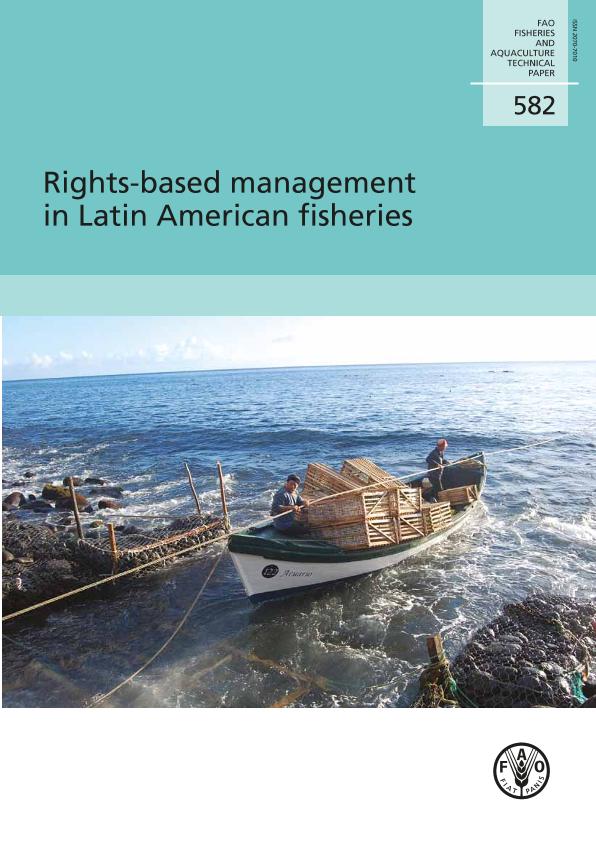Mostrar el registro sencillo del ítem
dc.contributor.author
Orensanz, Jose Maria

dc.contributor.author
Cinti, Ana

dc.contributor.author
Parma, Ana Maria

dc.contributor.author
Burotto, Lorena
dc.contributor.author
Espinosa Guerrero, Silvana
dc.contributor.author
Sosa Cordero, Eloy
dc.contributor.author
Sepúlveda, Cristian
dc.contributor.author
Toral Granda, Verónica
dc.date.available
2016-12-06T16:58:12Z
dc.date.issued
2013
dc.identifier.citation
Orensanz, Jose Maria; Cinti, Ana; Parma, Ana Maria; Burotto, Lorena; Espinosa Guerrero, Silvana; et al.; Latin American rights-based fisheries targeting sedentary resources. Part I; Food and Agriculture Organization of the United Nations; FAO Fisheries and Aquaculture Technical Papers; 582; -1-2013; 1-69
dc.identifier.isbn
978-92-5-107896-9
dc.identifier.isbn
978-92-5-107897-6
dc.identifier.issn
2070-7010
dc.identifier.uri
http://hdl.handle.net/11336/8897
dc.description.abstract
This study reports on a diversity of cases of rights-based benthic and finfish fisheries from Latin America. Each case specifies the main attributes of the access rights (in a broad sense, including privileges), whether formal or informal. The study also explores and discusses the following questions: How can, the property rights systems illustrated in the case studies, improve the incentives for stewardship, conservation and sustained profitability? What sorts of distributional implications are there in each of the rights-based finfish fisheries reported? What sorts of operational requirements do the different types of property rights documented demand in terms of research, enforcement, administration and actual fishing operations? The diversity of rights-based management schemes reported for benthic and finfish fisheries in Latin America seems to respond to (i) local fishery contexts, (ii) institutional, resource and ecosystem dynamics, and (iii) governance capacities in place. At this stage of establishing rights-based schemes in Latin America, a commonality found in virtually all study cases is the non-transferability of formal privileges. It seems to reflect the concerns for potential concentration of fishing rights on a few hands were transferability introduced. In many of the cases discussed, non-divisibility of rights is also specified. In contrast, informal access privileges are effectively transferable and divisible in some customary tenure systems where seabed resources are targeted. Enforcement and compliance continues to be a challenge for many of the cases reported, particularly in artisanal fisheries. Community self-policing in fisheries with limited number of participants seems to facilitate compliance with regulations and granted rights. Because of the relatively short time span over which the reported formal right-based systems have been in place, the sustainability performance of most of them cannot yet be properly assessed.
dc.format
application/pdf
dc.language.iso
eng
dc.publisher
Food and Agriculture Organization of the United Nations
dc.rights
info:eu-repo/semantics/openAccess
dc.rights.uri
https://creativecommons.org/licenses/by-nc-sa/2.5/ar/
dc.subject
Fisheries
dc.subject
Tenure
dc.subject
Access Rights
dc.subject
Sedentary Resources
dc.subject.classification
Pesca

dc.subject.classification
Agricultura, Silvicultura y Pesca

dc.subject.classification
CIENCIAS AGRÍCOLAS

dc.title
Latin American rights-based fisheries targeting sedentary resources. Part I
dc.title
(FAO Fisheries and Aquaculture Technical Papers: Rights-based management in Latin American fisheries / José María Orensanz and Juan Carlos Seijo, ISSN 2070-7010; nro. 582)
dc.type
info:eu-repo/semantics/article
dc.type
info:ar-repo/semantics/artículo
dc.type
info:eu-repo/semantics/publishedVersion
dc.date.updated
2016-11-23T19:43:29Z
dc.journal.volume
582
dc.journal.pagination
1-69
dc.journal.pais
Italia

dc.journal.ciudad
Roma
dc.conicet.avisoEditorial
El contenido del sitio web de la FAO está protegido por derechos de autor. Para garantizar la amplia difusión de su información, la FAO se ha comprometido a poner libremente a disposición de los interesados este contenido y alienta el uso, la reproducción y la difusión de los textos, productos multimedia y datos presentados. Salvo que se indique lo contrario, el contenido se puede adaptar, traducir, copiar, imprimir y descargar con fines de estudio privado, investigación y docencia, y para uso en productos o servicios no comerciales, siempre que se reconozca de forma adecuada a la FAO como fuente y titular de los derechos de autor y que no se indique o que ello implique en modo alguno que la FAO aprueba los puntos de vista, productos o servicios de los usuarios. La FAO promueve el uso sin restricción de los comunicados de prensa publicados en su sitio web y no se requiere autorización formal para reproducir dicho material.
dc.description.fil
Fil: Orensanz, Jose Maria. Consejo Nacional de Investigaciones Científicas y Técnicas. Centro Nacional Patagónico; Argentina
dc.description.fil
Fil: Cinti, Ana. Consejo Nacional de Investigaciones Científicas y Técnicas. Centro Nacional Patagónico; Argentina
dc.description.fil
Fil: Parma, Ana Maria. Consejo Nacional de Investigaciones Científicas y Técnicas. Centro Nacional Patagónico; Argentina
dc.description.fil
Fil: Burotto, Lorena. Subsecretaría de Pesca; Chile
dc.description.fil
Fil: Espinosa Guerrero, Silvana. Instituto de Investigaciones Marinas y Costeras; Colombia
dc.description.fil
Fil: Sosa Cordero, Eloy. El Colegio de la Frontera Sur. Unidad Chetumal; México
dc.description.fil
Fil: Sepúlveda, Cristian. Universidad Católica del Norte; Chile
dc.description.fil
Fil: Toral Granda, Verónica. World Wildlife Fund; Ecuador
dc.journal.title
FAO Fisheries and Aquaculture Technical Papers
dc.relation.alternativeid
info:eu-repo/semantics/altIdentifier/url/http://www.fao.org/fi/website/MultiQueryAction.do?
dc.relation.alternativeid
info:eu-repo/semantics/altIdentifier/url/https://goo.gl/jhF1AY
Archivos asociados
